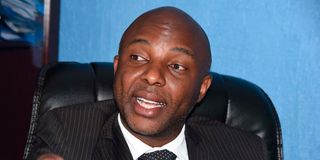Kang'ata promises to increase Murang'a development budget by 70pc

Murang'a Governor Irungu Kang'ata. He has promised to increase the county's budget for development.
Murang'a Governor Irungu Kang'ata has said development funding will grow by 70pc in the 2022/23 fiscal year.
He said this can be achieved if he raises local annual revenues from the current Sh500 million to Sh800 million (60pc) and reduces recurrent expenditure from 45 percent of total revenues to 35 percent.
"We are currently undergoing test runs on digitised revenue collection. We are sure that we will increase the amounts collected by 60 percent,” he said.
“We will also seal haemorrhage that goes with human corruption. We will also exercise prudence and austerity so that we can save more amounts to go to development."
Dr Kang'ata added that Murang’a will receive Sh7 billion from the National Treasury.
"Add the Sh800 million from our local revenues as well as Sh500 million from conditional grants. From that amount, we are anticipating to streamline ourselves to set aside at least Sh3 billion for development," he said.
Murang'a County Assembly Speaker Johnson Mukuha said he will marshal House leaders to support the drive.
"We are not neglecting our oversight role and we are not going to be at war with the county executive. Ours is to support the Murang'a dream that we collectively share under the United Democratic Alliance (UDA) manifesto," Mr Mukuha said.
Senator Joe Nyútú vowed to “lobby for more resources, relevant policy interventions and honest oversight”.
Dr Kang'ata said his predecessor Mwangi wa Iria's administration had committed more than 70 percent of its development budget to irregular vote heads that included fake salaries and pending bills.
Mr Wa Iria previously told Nation.Africa: "I don't think you are talking about Kenya, let alone Murang'a, and the insinuations therein are demonic".
Dr Kang'ata projected that by 2027, the county will be setting aside at least Sh6 billion for development.
"It is achievable since all we have to do is to increase earnings in the agricultural sector, exercise trade freedom and support new startups to expand our taxation base,” he said.
“Then lobby for the equitable share to go up on account of our arid areas that account for 30 percent of [the county]."
He said another way to achieve greater development is for the county to partner with the national government and the private sector.
"It is through such initiatives that we will deliver on our manifesto,” he said.
“We have to ensure that we get a functioning health sector, industrialise our windows of opportunity as well as ensure ward reps are the development implementation agents by allocating them a ward development fund."
He said Murang’a spends on average Sh600 million on private healthcare per year, a burden he thinks he can remove from residents' shoulders by making the health sector more efficient and reliable.
"Today, from the comfort and privacy of my Murang'a office, I can monitor our medicine stocks, dispensation and replenishment needs at the touch of a button,” he said.
“It's all displayed on the monitor screen ... even daily incomes can be seen as they are remitted in real time."
A functioning health sector serving insured residents, he said, is critical in enhancing productivity and lowering private hospital bills.
The money saved would be invested in the county’s economy, he added.





